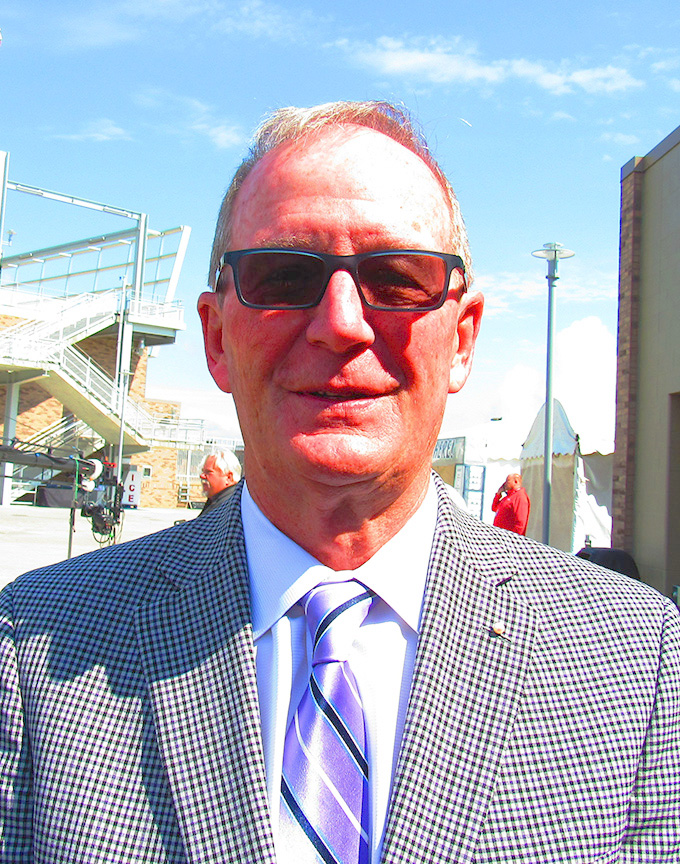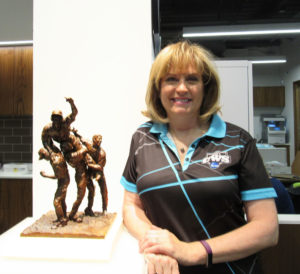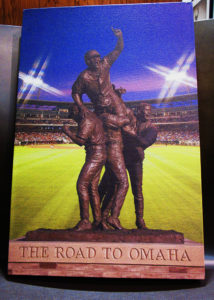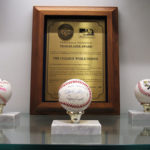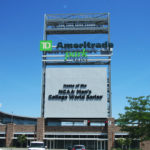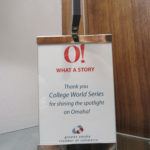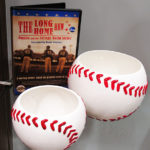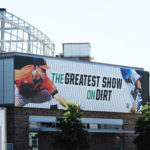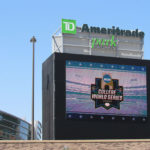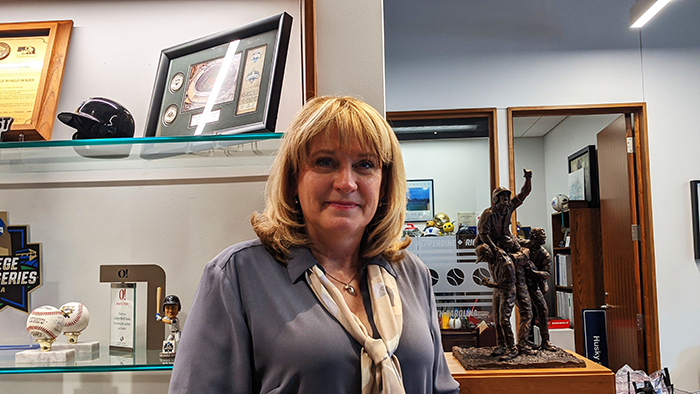
OmahaNebraska.com with Kathyrn Morrissey here at the College World Series of Omaha, Inc. and we are discussing the upcoming College World Series and all the new changes and go back in time with some reflections.
So you’ve been here the whole time since this particular office opened and then involved with the College World Series before.
We opened our office here across from the ballpark. It’s been five years. So yes, been here during that time. Before that, I actually started on the College World Series 35 years ago. It was with Mutual of Omaha and College World Series. Managing the general admission ticket function was one of my community relations project, so that that was my introduction 35 years ago.
And then my husband actually pitched to Jack Diesing Sr. and Jack Diesing Jr. that perhaps he could provide outsourced management assistance. He said he would do the first College World Series event for free, because Jack Sr. said, “Oh, we don’t have any money in the budget for somebody like that”. And Dan said, “If you see value in what I do, then we’ll talk after the series.” And we’ve been involved ever since.
And in fact, when the NCAA and College World Series of Omaha signed the agreement to keep the College World Series in Omaha through 2036. At that point, the NCAA said we love Omaha, we love your organization, but you’re an all-volunteer organization and board. So you might want to give some thought to full time employees because we see the event just getting bigger and bigger. And so in May of 2010 College World Series became our employer and I was the first executive director.
How many people did you have when you started?
Virtually the same staff size we have now which is four full time and one part time, but I always say we’re like an accordion. As we get closer to the event we expand with the help of wonderful interns. It’s a very much in demand internship. We draw students from all over the country. And then after the College World Series ends, we kind of contract and become our 4.5 staff that we have year round.
When does the prep for the series start?
The prep for next year’s series will begin probably before we end this current year’s series. The reason being we take advantage of the NCAA being in town, their staff being here, to do some early planning for next year. And we literally will get together every year before October 31. That’s a requirement of our contract to talk about what happened in the previous College World Series, what we think are areas of improvement and start the planning process in earnest at that point. But budgeting starts even in September.
So you do the debriefing and any future pivoting planned out almost immediately.
While it’s all fresh in our heads knowing that things will change along the way. But that’s the beauty of a multi-year event. We get to fine tune it. Make it better every year because none of us want to take it for granted. We always want it to be better. So, that’s been our standard practice for as long as I’ve been involved.
I’ve enjoyed it each and every year I’ve been coming and it’s wonderful and I see the fans so happy. There is so much more to the experience, as you know, than just baseball.
It is the one time of year, I should say one of the times a year, that Omaha is a destination. And it’s so much fun for everybody. Whether you’re working in a hotel or a restaurant or you’re just a citizen of the metro area. All those folks do such a great job of making our visitors feel welcome, and making sure that baseball players, the student athletes, feel like rockstars when they’re here. They really love that.
There have been, I’m sure, during the 35 years, huge changes not just Rosenblatt to here. So can you tell us about a few of the big changes? And then maybe one of your favorite changes?
Sure. One of the big changes is just the number of people that put on the event. When I first started working on this, the NCAA said two people, Denis Pope and Jim Wright, and Jim Wright used to spread out credentials, primarily for the media on his hotel room bed. And between the two of them and the city of Omaha staff who managed Rosenblatt and a core group that worked with College World Series of Omaha. That was it. We were kind of a small, but mighty group.
And obviously that has changed over the years. The NCAA sends a lot more people now. A lot more people are involved year round. And I think that’s been a really good development.
Now in terms of things that have happened. Gosh.
I know you can’t tell them all.
I know. Actually just building the North Downtown stadium, that obviously a lot of people had some misgivings about whether or not that would be a good thing because Rosenblatt was such an amazing home from 1950 to 2010. That’s a lot of history. And that was a beautiful place to make memories. But it was not unlike a family home that just got too small for the family. So we needed a bigger space. And the wonderful thing about the stadium helped with the North Downtown development. It’s not been the sole catalyst for that there were early pioneers who were here before us, but I think we’ve done something to help area people become more familiar with the area and certainly the people from out of town.
I love watching economic development. You know-how does a particular business or industry help an area? When is its time maybe up on other factors. People move in with certain jobs and children with leave the areas different jobs. It’s really fascinating. So we’ve [OmahaNebraska.com] been concentrating different neighborhoods like that. I think you’re technically North Downtown?
Yes. North Downtown, we are kind of in the midst of what they call the Makerhood. And you know, it’s just a real creative area, whether it’s some of the lost arts like upholstery and furniture making and such or if it’s the super almost the techie side opposite you know startups and such that are very technology driven. We’re surrounded by all of that in addition to music, and food and beverages and and, it’s really an exciting place to be.
Hot Shops [Hot Shops Art Center, https://www.hotshopsartcenter.org] was also very important to the economics of this area too.
They were one of the early pioneers I mentioned. I mean, they have done amazing things there. And what I’m really excited to see is that the fans have gotten more comfortable venturing out from the stadium and I think they go over to Hot Shops and they visit. And now we hope that they extend their reach maybe a little bit further into Millworks Commons and you know they go a little bit north, a little bit west.
And certainly they haven’t forgotten some of their favorite haunts in the Old Market. They’ve watched as the Capital District grew up and found some great places there that are intriguing to them. So we’re hoping to spread that economic impact over a wider area because all parts of the metro get that even if there aren’t they aren’t adjacent or near to the stadium.
There’s several things in Nebraska that bring a huge amount of revenue How much does the CWS bring in to the state?
We had Dr. Ernie Goss do an economic impact survey using 2019 figures because we didn’t foresee COVID But we did think that 10 years into “the great experiment” and that’s in air quotes. That was the downtown stadium that maybe people would want to know. Did that experiment turnout was that a good move? 88.3 million was the very conservative economic impact estimate he came up with at that time. Last year, we had attendance records. So I think we at least reached that milestone.
And I really think that we that the reach extends beyond there because I know our friends at Bozell estimated the media impact, 464 million. Now that includes social media too, of course now. So that’s why the figure is partially bigger than what people may expect. But when you think about what the Chamber of Commerce and the Convention and Visitor’s Bureau would have to pay for the kind of exposure, really positive exposure, we get for almost two weeks ,it’s pretty amazing.
What have you seen for the fan experience these many years?
Well, you know what’s great about this year is that we’ve got a new format. So we have two full weekends to offer. That’s especially important, I think to out-of-town visitors. Always before when we answer questions on the phone or live chat on the internet, people would say “w\Well, you know, I’m still working or my kids have activities, and so the only time we can get away is a weekend” and now we have two full weekends to offer. The opening ceremonies will be on Thursday. First day of games will be on Friday. And then we end the events either on a Sunday or a Monday. So that we think is going to be really good for the event.
We also have a lot of things that after kind of that semi-normal year last. We’ve got the Stadium Circulator [https://www.ncaa.com/championships/baseball/d1/transportation] coming back, which is wonderful. It kind of runs a grid pattern from the North Downtown stadium to the Old Market and it passes several City of Omaha parking garages, where you can make advance reservations for parking and it only costs a quarter to jump on.
Wow.
It’s ADA accessible. It’s air conditioned and should stop at about every 15 minutes at the various locations that are on the map. And the map is on our website https://cwsomaha.com under parking and transportations. [https://cwsomaha.com/parking-and-transportation-information]
I’m trying to think other things that are different new about this year. Well actually not even. It was the case last year. The outfield is our lowest price reserve status, no longer general admission. We had really thought we would be coming to GA this year because, of course, during COVID nobody was excited about standing shoulder to shoulder for several hours with people they didn’t make perfect sense to have that transition last year.
We, meaning the NCAA, surveyed fans after every game last year, throughout the stadium, but with the feedback that we got from the general admission, now the lowest price reserved area was “We love this. Do not go back to GA. We think it’s great that we know for sure we’ll be able if we have a ticket for a specific game that will get into that game. And if we want to come early, it’s wonderful that we can spend the time in the fan fest or frequenting restaurants or other establishments in the area. So don’t go back”. So that’s where we’re at today. That’s our lowest price reserved seat. And there’s still tickets available our single game tickets went on sale in mid-April. And there are still weekday afternoon games that are still available. Those are $10 plus Ticketmaster fees, and so very affordable.
But even if the other game tickets have sold out, which they did really quickly, like the first weekend and the finals, especially those are available on sale, through the NCAA website and https://www.ncaa.com or you can get there through our website, https://cwsomaha.com.
It’s interesting that over time the resale market being verified and legitimized has occurred. Seems natural now that we have it, but it hadn’t been.
Exactly. Well, Ticketmaster is the NCAA’s corporate ticketing partner. So if people buy through that outlet, then if they have any concerns when they get to the ballpark any issues at all, which we don’t anticipate that they do, but if they do, they can go to the ticket office and get customer service there. If they use another outlet to get their tickets, and I’m sure some fans do, unfortunately, we can’t help them in the same way.
The tickets now are electronic.
They are. They’re all mobile, digital, electronic… I’ve heard a lot of different ways to describe them. But yes, and our concessions are also credit card related. There are some reverse ATMs in the ballpark. So if you don’t have a credit card or you don’t want to send the kids with your credit card, you can send them with some cash. They can use the machines inside the stadium and access the concessions that way.
Where the reverse ATMs are located? Are there maps available?
There should be a map available, and I believe that one is certainly on the ballpark website which is this is a long one: http://www.charlesschwabfieldomaha.com.
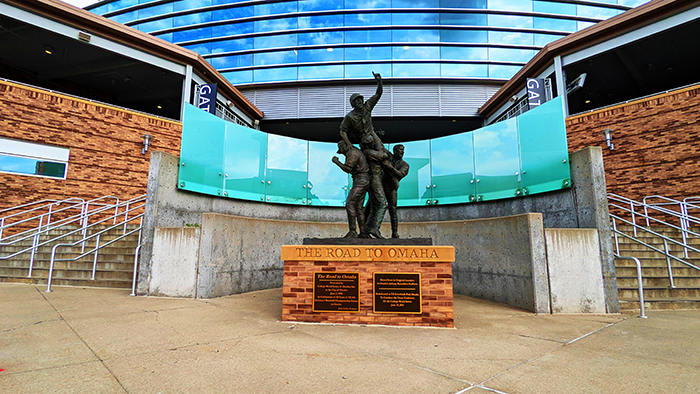
[End of Part One]
